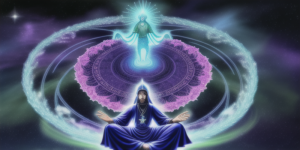Our ego, that indomitable force that shapes our perception and reactions, is at play in more situations than we often realize. Consider this: someone challenges our intelligence or character, resulting in a confrontation that leaves a bitter taste in our mouth. Our ego, wounded, springs into action. It fuels us to defend ourselves, to prove the offender wrong. We become consumed by a need to justify our worth, to salvage our dented self-image.
In the heat of the moment, we may lash back, engaging in a verbal duel fuelled by a potent cocktail of defensiveness and anger. However, what’s even more interesting is what happens after the event. Even when the person who instigated the conflict is no longer physically present, our mind continues the battle on its own.
The wheels of our thoughts continue to spin, maintaining a cycle of internal dialogue that is akin to reliving the situation over and over again. We find ourselves engaged in a self-sustaining argument, painstakingly constructing rebuttals, finding justifications, and seeking validations to console our bruised ego.
Our psyche, in a strange sort of preoccupation, continues this internal chatter for days, even weeks, long after the actual event has transpired. It’s as if our mind is caught in a relentless loop, unable to break free from the gravitational pull of the incident that challenged our ego.
This relentless self-talk, this internalized argument, represents a state of neurosis that is often overlooked because it’s so commonplace. It seems almost normal because everyone appears to function in much the same way. Our society rarely discusses this, and as a result, we end up accepting it as a standard part of our mental functioning.
However, such acceptance doesn’t negate the truth that this internal chatter, driven by ego, can be mentally exhausting. It takes up our mental resources, obstructs our ability to focus on the present, and contributes to a distorted self-perception.
Interestingly, it’s not just the person who instigated the conflict that bears the brunt of our rage. The friends we call upon to listen to our grievances often end up caught in the crossfire. As we obsessively rehash the incident, we may unconsciously expect them to unequivocally side with us. Any hint of disagreement or impartiality can feel like a personal affront, leading to tension and misunderstandings within these relationships.
This reactive and defensive behavior can also lead us to inadvertently push away those who genuinely care for us. The anger and resentment we harbor can taint our interactions, turning what could be supportive and understanding dialogues into volatile confrontations. Over time, our loved ones may find it increasingly difficult to navigate our ego-driven outbursts, leading to strained relationships or even estrangement.
In this manner, our ego, in its pursuit to protect our self-image, ironically ends up causing us more harm than good. It not only disrupts our mental peace but also damages our interpersonal relationships, isolating us in a self-created fortress of defensiveness and resentment. It’s essential to recognize this pattern and strive to foster healthier mechanisms to cope with challenges to our self-esteem, for our own mental health and the wellbeing of our relationships.
Moreover, this neurosis, fueled by our ego, keeps us chained to past conflicts and grudges, preventing us from experiencing genuine peace of mind. The constant need to prove ourselves, the endless pursuit of validation, is a self-defeating cycle that offers no real satisfaction or resolution.
Thus, understanding the role of the ego in these self-perpetuating thought processes is critical. By being aware of the triggers and mechanics of this mental phenomenon, we can begin to recognize when we are trapped in these loops of self-argument and ego-defense. And it’s through this recognition that we can begin to challenge and eventually change these deeply ingrained patterns of thinking.
Understanding the futility of the ego and recognizing its intangible nature is a key step in gaining control over its influence. The ego can be likened to a shadow, an ephemeral, formless entity that holds no tangible substance yet has a profound influence on our behavior.
Imagine the ego as a glass castle in the mind, a structure constructed from the intangible bricks of opinions, beliefs, and values, most of which have been handed down to us by society, culture, and others around us. Its walls are fortified by our desire to preserve our self-image, to uphold the ideals that we believe define us. Yet, despite its grandeur, this castle is ultimately an illusion, a mental construct with no real, tangible existence.
However, our mind often fails to recognize the ethereal nature of this castle. When our ego is challenged, it feels as if the glass castle is under siege. Our first instinct is to defend it, to ensure its survival. Ironically, this castle that we’re so desperate to protect is a castle of air, an insubstantial structure that we’ve mistaken for a solid fortress. It was only a mental construct.
In these moments of challenge, the ego can transform into a wrecking ball, intent on causing destruction to preserve its existence. It can fuel actions and reactions aimed at defending the ego, even if it means hurting others in the process. Such is the power of this illusion that everything else can seem insignificant in comparison. It’s a strange paradox – we strive to protect something that is essentially an illusion, often at great cost.
The ego, then, is like a phantom puppeteer, pulling the strings of our actions and reactions based on a script written by others – society’s norms, cultural expectations, and so forth. It’s as if we’ve been handed a script for a play we didn’t choose to be in, playing a role that we didn’t choose for ourselves. This script, this role, becomes a mental trap, a conditioning that we unconsciously adhere to.
The key to breaking free from this mental conditioning is awareness. It’s about developing the ability to step back and view our thoughts, emotions, and reactions from a place of detached observation. By doing so, we can start to see the glass castle for what it is – a mere illusion, an insubstantial construct of the mind.
Understanding the futility of the ego, recognizing its intangible nature, and becoming aware of the mental conditioning it represents can help us loosen the ego’s grip on our lives. By doing so, we can begin to dismantle the glass castle, brick by brick, and free ourselves from its confines.
In essence, it’s not just about understanding the root causes of our emotions and reactions but also about being aware of our mental patterns, especially the ones that cater to our ego. Recognizing the ego’s influence and our conditioned responses can help us pave the way towards mental liberation, where we are no longer held captive by past conflicts, grudges, or the incessant need for self-validation.





